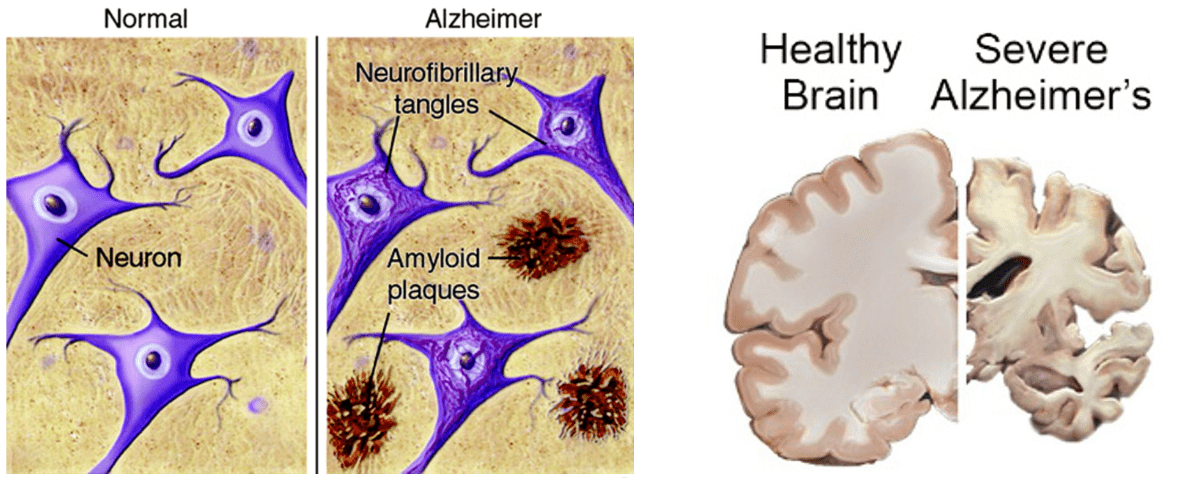
Misrepresents a complex reality: Although some studies suggest that certain nutritional deficiencies, such as that of vitamin A, B12, C, and D, might increase one’s risk of Alzheimer’s, there are several factors influencing the risk of Alzheimer’s. No evidence so far shows that nutritional deficiencies alone cause Alzheimer’s.
Overstates scientific confidence: The role of nutritional deficiencies in Alzheimer’s disease isn’t fully understood yet and further research is required.

FULL CLAIM: Alzheimer’s disease is a “physician-caused disease” that arises due to nutritional deficiencies
REVIEW
A Facebook reel of an interview snippet claiming that Alzheimer’s disease is caused by nutrient deficiencies rather than genes went viral in early May 2023. The claim was made by Joel Wallach, a veterinarian and naturopath, who also previously falsely claimed that cholesterol-lowering drugs cause Alzheimer’s. Wallach has previously made unsubstantiated health claims, and his company, Youngevity, has even received warnings from the U.S. Food and Drug Administration for claims regarding COVID-19 cures.
As we will explain below, Wallach’s claim contradicts the current scientific understanding of Alzheimer’s disease.
Alzheimer’s disease is a form of dementia, characterized by damage to and death of neurons, cells that transmit electrical signals between the brain and other parts of the body. This is associated with three main characteristics. Firstly, amyloid plaques, made from the beta-amyloid protein, collect between neurons, causing damage. Secondly, neurofibrillary tangles comprising the tau protein accumulate in neurons, blocking normal, healthy communication between the cells. Additionally, microglia (cells that remove waste in the brain, such as amyloid plaques) don’t function correctly in Alzheimer’s disease, allowing this buildup to continue, so the disorder progresses.
Such damage begins in parts of the brain related to memory, such as the hippocampus. It then continues to damage areas involved in language and social behavior, such as the cerebral cortex[1]. Thus, Alzheimer’s is characterized by symptoms such as impaired memory and problem-solving ability, personality changes, reduced attention span, and a loss of ability to be independent in daily tasks. Alzheimer’s mainly develops in individuals in their mid-60s or older.

Figure 1 – Left: Amyloid plaques and neurofibrillary tangles in the brain of a normal person versus a person with Alzheimer’s disease. Right: The extent of damage that an individual’s brain can develop due to Alzheimer’s. This image was taken post-mortem (after death). Sources: Silbert LC and the U.S. National Institute on Aging.
Currently, there’s a lack of concrete evidence on the role of nutritional deficiencies in the development of Alzheimer’s, but some studies have reported an association between deficiencies in certain vitamins and a higher risk of disease.
For example, vitamin A deficiency is associated with dementia in general, due to the role of vitamin A in neuronal development[2]. Similar results have been observed with vitamin C deficiency, as vitamin C helps to regulate beta-amyloid activity[2]. Vitamin B12 deficiency has also been linked with Alzheimer’s and cognitive decline[3,4]. This could be related to elevated levels of the amino acid homocysteine, which one study in the New England Journal of Medicine reported as a “strong, independent risk factor” for Alzheimer’s[5].
Another nutritional risk factor appears to be vitamin D deficiency, as decreased blood levels of vitamin D have been correlated with brain atrophy and cognitive decline[6,7]. Studies have also found that vitamin D exposure was associated with lower dementia incidence and risk[8-10].
On the other hand, there are also studies that presented conflicting results. For example, some recent studies reported that increasing vitamin D intake had no significant effect on dementia or cognition[11] or even exacerbated Alzheimer’s disease[12].
Furthermore, it’s also unclear whether it is actually nutritional deficiencies that contribute to Alzheimer’s or if it is Alzheimer’s itself that causes nutritional deficiencies since the disease can lead to changes in diet and lifestyle.
Therefore, this claim overstates the role that nutrition plays in the development of Alzheimer’s disease, as there isn’t enough evidence to reliably conclude that nutritional deficiencies increase the risk of Alzheimer’s.
The claim failed to acknowledge the role of genetic factors, which are also associated with increasing the risk of Alzheimer’s. For example, some studies found that mutations in certain genes correlate with amyloid plaque formation and the onset of Alzheimer’s[13,14]. Furthermore, inheriting one particular allele of the APOE gene, called e4, appears to be a risk factor, with up to 65% of individuals with Alzheimer’s possessing the e4 form[15].
Apart from genetics and nutrition, there are also many other factors linked to Alzheimer’s, including old age, mitochondrial or blood vessel dysfunction, head injuries, air pollution, infections, and obesity[16]. Simply put, the evidence shows that Alzheimer’s is a multifactorial disease, and its cause cannot be attributed to any one factor, contrary to the claim made by Wallach.
Conclusion
The claim that Alzheimer’s is caused by nutritional deficiencies is incorrect and overstates the scientific evidence for the role of nutrition in Alzheimer’s. Contrary to the claim made in the Facebook reel, Alzheimer’s is a complex disease that is associated with multiple factors, including genetic, environmental, and lifestyle factors. Although some studies suggest that certain vitamin deficiencies might play a role in the risk of developing Alzheimer’s, when the evidence is taken as a whole, the findings are contradictory and insufficient to establish a definite link. Therefore, this video grossly oversimplifies the causes for Alzheimer’s disease.
REFERENCES
- 1 – Planche et al. (2022) Structural progression of Alzheimer’s disease over decades: the MRI staging scheme. Brain Communications.
- 2 – Mielech et al. (2020) Vitamins in Alzheimer’s Disease-Review of the Latest Reports. Nutrients.
- 3 – O’Neill et al. (1993) Reversible Dementia Caused by Vitamin B12 Deficiency. Journal of the American Geriatrics Society.
- 4 – Wang et al. (2001) Vitamin B(12) and folate in relation to the development of Alzheimer’s disease. Neurology.
- 5 – Seshadri et al. (2002) Plasma Homocysteine as a Risk Factor for Dementia and Alzheimer’s Disease. The New England Journal of Medicine.
- 6 – Littlejohns et al. (2014) Vitamin D and the risk of dementia and Alzheimer disease. Neurology.
- 7 – Briones et al. (2012) Vitamin D mitigates age-related cognitive decline through the modulation of pro-inflammatory state and decrease in amyloid burden. Journal of Neuroinflammation.
- 8 – Ghahremani et al. (2023) Vitamin D supplementation and incident dementia: Effects of sex, APOE, and baseline cognitive status. Alzheimer’s and Dementia.
- 9 – Shen et al. (2015) Vitamin D deficiency is associated with increased risk of Alzheimer’s disease and dementia: evidence from meta-analysis. Journal of Nutrition.
- 10 – Annweiler et al. (2012) Higher vitamin D dietary intake is associated with lower risk of alzheimer’s disease: a 7-year follow-up. The Journal of Gerontology.
- 11 – Schietzel et al. (2019) Effect of 2000 IU compared with 800 IU vitamin D on cognitive performance among adults age 60 years and older: a randomized controlled trial. American Journal of Clinical Nutrition.
- 12 – Lai et al. (2022) Vitamin D supplementation worsens Alzheimer’s progression: Animal model and human cohort studies. Aging Cell.
- 13 – TCW and Goate. (2017) Genetics of β-Amyloid Precursor Protein in Alzheimer’s Disease. Cold Spring Harbor Perspectives in Medicine.
- 14 – De Strooper B. (2007) Loss-of-function presenilin mutations in Alzheimer disease. EMBO Reports.
- 15 – Safieh et al. (2019) ApoE4: an emerging therapeutic target for Alzheimer’s disease. BMC Medicine.
- 16 – Livingston et al. (2020) Dementia prevention, intervention, and care: 2020 report of the Lancet Commission. The Lancet.


